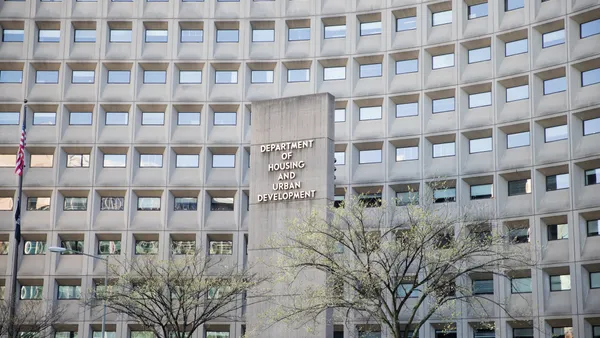UPDATE: Oct. 14, 2025: The U.S. Senate last week passed bipartisan legislation designed to spur affordable housing development through grants and regulatory reform.
The Renewing Opportunity in the American Dream (ROAD) to Housing Act, introduced by Sens. Tim Scott, R-S.C., and Elizabeth Warren, D-Mass., was included as part of the National Defense Authorization Act, which advanced in a vote of 77-20. The ROAD to Housing Act sailed through the Senate Committee on Banking, Housing, and Urban Affairs in a July vote of 24-0.
“Solving our housing crisis requires a range of solutions, and this bill provides needed regulatory reforms, the reauthorization of critical programs, and new investments in housing revitalization,” U.S. Conference of Mayors President and Oklahoma City Mayor David Holt said in a statement. “We appreciate this bipartisan action and are eager to now work with members of the House to ensure a final bill can soon become law.”
Columbus, Ohio, Mayor Andrew Ginther, who chairs USCM’s housing task force, said in a release that the bill “provides a real opportunity to make affordable housing possible for more people.”
“This is a historic and long-overdue step forward,” Ginther said.
The bill advances to the U.S. House of Representatives, where House Speaker Mike Johnson, R-La., has vowed not to hold any votes until the ongoing government shutdown ends.
Dive Brief:
- A bipartisan bill that seeks to expand access to affordable housing and increase housing production through regulatory reform advanced through the Senate Banking, Housing and Urban Affairs Committee on Tuesday.
- The Renewing Opportunity in the American Dream (ROAD) to Housing Act would ease some environmental regulations to speed up housing development and provide incentives such as grants for localities to embrace “pro-housing” policies that “remove regulatory barriers to the construction or preservation of housing units, including affordable housing units.”
- The bill has support from housing advocates, including from the U.S. Conference of Mayors, which called it “a landmark piece of legislation that addresses the urgent need to make substantial movement on the national housing crisis.”
Dive Insight:
Mayors have been sounding the alarm on the U.S. housing crisis “for years now,” Columbus, Ohio, Mayor Andrew Ginther said earlier this year. Ginther is immediate past president of the U.S. Conference of Mayors and chair of its Housing Task Force.
The conference’s June 2025 survey of mayors found that 51.5% believe housing affordability in their cities will worsen in the next year, and more than 94% reported their residents are “dissatisfied or very dissatisfied” with housing affordability.
Support from the federal government to address the crisis seemed in doubt after the Trump administration in May announced plans to slash Department of Housing and Urban Development funding by more than $33 billion for the 2026 fiscal year.
The ROAD to Housing Act — reportedly the first housing bill to pass through the Senate committee in more than a decade — contains at least 27 pieces of previously introduced legislation, according to the Bipartisan Policy Center. It could offer major solutions cities have been looking for, according to the Conference of Mayors.
“The bill lays the groundwork to address the nation’s urgent need to boost housing supply, improve housing affordability, and increase oversight and efficiency of federal regulators and housing programs,” Ginther and Conference of Mayors CEO Tom Cochran said in a letter to the Senate Banking Committee chairman, Tim Scott, R-S.C., and ranking member, Sen. Elizabeth Warren, D-Mass.
Among its provisions, the bill would
- Exempt certain housing projects from environmental reviews previously required under the National Environmental Policy Act.
- Eliminate the permanent chassis requirement for manufactured homes, which advocates call a regulatory burden to new construction.
- Require the development of guidelines on state and local zoning within three years to “support production of adequate housing to meet the needs of communities and provide housing for individuals at every income level.”
The legislation largely focuses on regulatory changes, but it also establishes an Innovation Fund, a five-year, $200 million grant program for entities that have found demonstrable ways to expand housing supply in their jurisdictions. HUD’s Community Development Block Grant program, which distributes approximately $3.5 billion annually, would also be refocused to favor “localities with above-median housing costs and above-median rates of growth” and put new reporting requirements for grant recipients in place, Reason reported.











